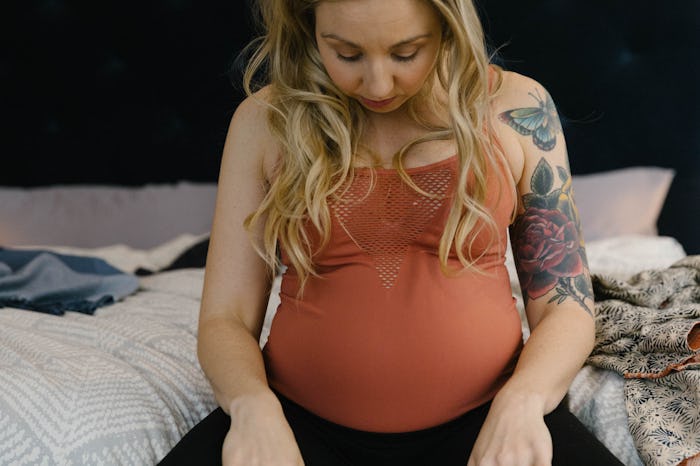Life

Here's Why You'll Spot During Pregnancy, According To Experts
There's more than a few reasons to worry when you're pregnant. If your blood pressure is too high, preeclampsia becomes a valid fear. If your feet swell, a late-night Google session could leave you concerned about blood clots. And then, of course, there's sporadic bleeding, which can frighten even the most seasoned mother-to-be. So if you're wondering why you spot during pregnancy and eyeing your cellphone, ready to call your OB-GYN at any moment, take a deep breath and consider the following before you alert the masses.
The March of Dimes says up to half of women will have bleeding or spotting at some point during their pregnancy. It's worth noting, however, that the most typical spotting during pregnancy occurs in the firs trimester, during the "implantation process where the fertilized egg attaches to the uterine lining." The American Pregnancy Association (APA) says 20 percent of pregnant women report experiences of spotting during the first 12 weeks of gestation. The APA also reminds pregnant women of another frequent reason for spotting during pregnancy, saying:
Another common cause of spotting is a cervical polyp (a harmless growth on the cervix), which is more likely to bleed during pregnancy due to higher estrogen levels.
Minimal spotting can also happen after sex, hormonal changes, a recent vaginal exam performed by your doctor, or could be signs of a possible infection. Parents tells moms-to-be that any heavier bleeding be checked out to eliminate the possibility of miscarriage, ectopic pregnancy, and placenta previa. If you aren't sure whether or not you're experiencing spotting or bleeding, pay close attention to the color and amount of discharge. Self describes heavy, period-like bleeding, accompanied with intense pain (cramping), that doesn't let up in intensity, as serious and reason to call your doctor or head to the emergency room. Even if you're experiencing light spotting for a few days in a row, you should call your OB-GYN immediately.
Aside from the aforementioned causes of light spotting during pregnancy, there's also a chance you could have a cervical polyp, which the APA describes as a "harmless growth." With minimal spotting, the APA also suggests you spend some time off your feet (with elevation to reduce swelling), rest, limiting physical activity, and avoiding lifting more than 10 pounds to see if the symptoms subside. Most women go on to have completely normal, healthy babies, despite spotting through pregnancy. Though, when in doubt, ask your doctor to be sure you don't need a more detailed medical treatment plan.